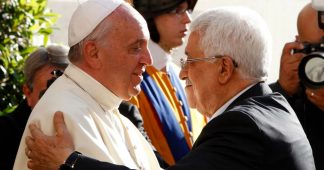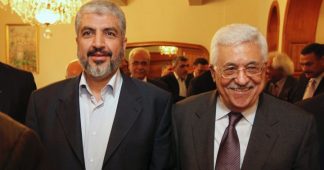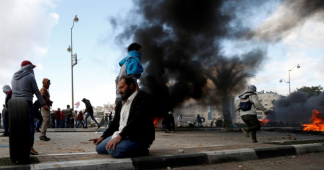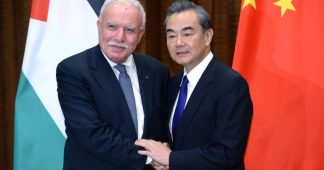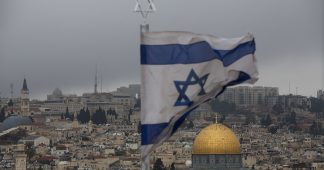Are we entering the endgame of the Israel-Palestine conflict? A panel of analysts assesses where things are heading
by Norman Finkelstein, Mouin Rabbani, Sam Bahour, Alain Gresh, Jon Elmer, Adam Hanieh
First published: 23 December, 2013
Veterans of twenty years of empty negotiations between Israel and the Palestinians may too easily dismiss the current talks, led by US Secretary of State John Kerry, as simply more of the same. Yet they are occurring in a dramatically changed political environment. What are the implications for Palestine of the regional upheavals of the past few years? How sincere are Kerry and the EU in their apparent determination to secure an agreement? What would that settlement look like? And what other important trends are emerging that will shape the future trajectory of the conflict?
We’ve invited a panel of acute analysts and observers of the conflict to summarise the current state of play in Palestine, and where things are headed.
Contributing to the discussion are:
Norman Finklestein and Mouin Rabbani – co-authors of How to Solve the Israel-Palestine Conflict
Jon Elmer – journalist based in the occupied Palestinian territories
Alain Gresh – journalist and editor of Le Monde diplomatique
Adam Hanieh – senior lecturer at SOAS and author of Lineages of Revolt
Sam Bahour – Palestinian political commentator and business consultant
Norman Finkelstein and Mouin Rabbani
When Israeli-Palestinian negotiations resumed earlier this year, it was widely assumed they would go down in history as just that—one more round of Israeli-Palestinian negotiations. Yet, there are growing indications the Americans are formulating a concrete, detailed proposal for presentation in early 2014, and will use their considerable clout to compel the parties to sign on the dotted line before the year is out.
The anticipated treaty would permanently institutionalize the arrangements introduced by Oslo and developed over the subsequent two decades, and legitimize them with formal regional and international recognition. Whether it takes the form of a comprehensive settlement or an interim agreement and declaration of principles, the upshot of a deal on these terms would be the same: a dependent Palestinian statelet east of the West Bank Wall, exercising no meaningful powers in or over East Jerusalem and recognizing Israel as a Jewish state, thereby transforming the refugee question from a political to a humanitarian issue.
The Americans have been working hard to line up international support for their plans. This includes not only the members of the Quartet but the Arab League as well. More recently, the European Union signalled its intentions by promising to generously support any deal while threatening to review its existing support if talks collapse. The Palestinian people, politically and geographically more fragmented than at any point in their history, will find it extremely difficult to effectively oppose such a scheme. If recent reports of a new Palestinian government supported by both Fatah and Hamas prove accurate, furthermore, the Islamists will be effectively neutralized.
Supporters of Palestinian self-determination have engaged in extensive debate over the relative merits of a ‘one state’ versus a ‘two-state’ strategy. The prospect of a new Israeli-Palestinian agreement brings into sharp relief a more pertinent set of alternatives: the decolonization of the occupied territories in accordance with the international, Arab and Palestinian consensus that existed on the eve of the Oslo accords, versus the permanent subordination of these territories to Israel, and the permanent dispossession of other Palestinian communities, through the successful conclusion of the process that commenced in 1993.
In this scheme of things, one of the most acute dangers is the gradual emergence of a new international as well as regional consensus that could further restrict and obstruct the ability of Palestinians to achieve their rights, particularly if it is anchored in new United Nations resolutions and endorsed by other regional and international bodies. Those who base their political activity at least in significant part on international law, irrespective of the solution they promote, need to consider the consequences of an agreement, ratified by a recognized Palestinian leadership, endorsed by the international community, and legitimized by new United Nations resolutions, that transmogrifies common understanding of Palestinian rights and claims and reformulates the conflict as a border dispute. It is one thing to mobilise against a West Bank Wall that has been deemed illegal by the International Court of Justice, quite another when it is a recognized international border. It would be foolish not to prepare for such scenarios.
* Norman Finkelstein is a prominent activist and scholar of the Israel-Palestine conflict. Mouin Rabbani is contributing co-editor of Jadaliyya. They are working on a jointly authored book, How to Solve the Israel-Palestine Conflict (OR Books, forthcoming)
Two important trends have emerged over the past several years that are worth highlighting for the impact they will have on the strategic trajectory of the conflict: i) the development of the military capacity of the Gaza Strip and ii) the implications of Israel’s separation wall on the politics and dynamics of resistance in the West Bank.
During the principal period of construction of Israel’s West Bank wall (roughly, 2003-2009), a reasonable amount of attention was given to its physical imposition and consequences for Israeli security. Less attention has been devoted to the political implications of the sealing-off of Palestinian communities and its impact on avenues of resistance in the West Bank. While ever-present expressions of Palestinian opposition are often characterized as portending a “third intifada,” the reality is that the ghettoization of the West Bank has contributed significantly to a strategic paralysis in the Palestinian movement.
A key pillar of Israel’s ghettoization strategy has been the development of a Palestinian security force under US auspices, tasked with providing a buffer for the IDF by operating within the ghettos. This has set-up a dynamic that places the PA at the front-line of the next intifada, which raises the stakes considerably for Palestinians because of the intra-communal component. How Palestinians navigate and grapple with this strategic reality will be a defining characteristic of the conflict for the foreseeable future.
In Gaza, where Israel’s ghettoization project predates the one in the West Bank by a decade, the eight day war in November 2012 briefly foreshadowed the next chapter of the military conflict. Palestinians displayed significant advancements in military capacity and materiel, including most notably the ability to strike Tel Aviv and large swathes of Israel’s heartland. This was partly attributable to the expansion of the tunnel network in southern Gaza and the changing regional dynamics in the two years preceding the war (Egyptian unrest, looted Libyan weapons caches), but local production was also important. While the recent Egyptian crackdown on the tunnels has been devastating in the commercial sphere, the tunnel network remains and military importation continues.
On the one-year anniversary of the war Netanyahu went to great effort to highlight the “deterrent” effect of Israel’s attack, but a strong case can be made that the war had a similar effect on Israel. By a wide margin, 2013 was the least deadly year in the Gaza Strip since before the first intifada in 1987. A credible military deterrent in Gaza is a key shift in the strategic landscape, and will only deepen in the coming years.
* Jon Elmer (website, twitter) is a Canadian journalist who has been based in the West Bank and Gaza since 2003
Secretary of State John Kerry’s “peace initiative” coincides with the twentieth anniversary of the signing of the Oslo Accords. The diplomatic process those agreements initiated has had a disastrous effect on the Palestinian struggle, enabling Israel (along with its supporters in Washington and Europe) to be portrayed as a partner in, rather than the chief obstacle to, realising Palestinian rights. Oslo has been and remains a highly successful fig leaf behind which Israel has consolidated and deepened its control over Palestinian life. A Palestinian face may now preside over the day-to-day administration of Palestinian affairs, but ultimate power still rests with Israel.
What is notable about Kerry’s “new-old” initiative is its apparent emphasis on economic issues. Kerry himself emphasized this point in his speech to the World Economic Forum (WEF) in May 2013, where he declared that, “as long as prospects for economic advancement remain weak, so do the prospects for peace and stability.” This was followed by the announcement of the Palestinian Economic Initiative (PEI), endorsed by the Middle East Quartet in September 2013. The PEI builds upon the framework of earlier Palestinian development strategies, such as the 2007 Palestine Reform and Development Plan. The guiding principles of these strategies are quintessentially neoliberal: emphasizing an “enabling environment” for private-sector led growth, special economic zones to bring together Israeli and Arab investors in the exploitation of cheap Palestinian labour, public-private partnerships and reduced government expenditures. These strategies further entrench Palestinian reliance on the Israeli economy and thereby deepen normalization with Israel. Moreover, as the last decade strikingly confirms, they act to widen the already massive inequalities within Palestinian society.
One of the main aims of Oslo was to narrow the Palestinian question down to bartering over small slithers of land in the West Bank, whilst ignoring the rights of the entire Palestinian people, including Palestinian citizens of Israel and, most importantly, Palestinian refugees, who remain the largest segment of the Palestinian people and who continue to demand the right to return home. The Kerry initiative perpetuates this fragmentation, feeding the illusion that Israel, as an occupying power, can be a ‘partner for peace’ without addressing its fundamentally racist and settler-colonialist character. The narrow pragmatism of the Palestinian Authority, illustrated by its embrace of Kerry’s plans, is only collusive with this logic.
The situation is unsustainable and negotiations are leading nowhere. European policy is tail-ending that of the US, and neither have an interest in achieving real justice for Palestinians. But recent popular mobilizations against the Prawer Plan demonstrate that there is hope in collective, popular action across historic Palestine, despite the fragmentation imposed by Oslo. In this context, we need to reassert the fundamental unity and rights of all segments of the Palestinian people. Part of this involves rejecting moves to normalize relations with Israel; the strength of this strategy is reflected in the continuing successes of the boycott, divestment and sanctions (BDS) movement.
* Adam Hanieh is senior lecturer in development studies at SOAS and the author of Lineages of Revolt: Issues of Contemporary Capitalism in the Middle East (Haymarket Books, 2013)
Oslo is dead, but surviving in strange ways. On one hand, the idea of a transitional period leading to a stable resolution of the Israeli-Palestinian conflict with the creation of an independent Palestinian state alongside Israel seems more and more out of reach; it has been buried under the burden of 550,000 settlers. On the other hand, the institutions of Oslo are still in place and the international community, including the Israeli government, endorses it.
Where to go from there? It is not an easy question to answer for the Palestinians. The road to a new strategy will be long, and require from Palestinians a completely new vision, not only of their struggle but also of the world in the beginning of the twenty-first century. When the Palestinians began their struggle in the 1960s with the PLO, the world was divided between the United States and the Soviet Union; national liberation struggle was endorsed by the United Nations, and armed struggle was considered a legitimate means of resistance. Today, most struggles for national liberation have ended and armed insurgency is considered terrorism. Of course, we are entering a multilateral world, even a post-American one, but we cannot say, till now, that the policy of China or Brazil, of India or Russia, has changed the balance of forces, especially when dealing with the Palestinian problem.
The starting point of any Palestinian strategy must be the indisputable fact that two national communities of nearly equal size now live within the borders of historic Palestine. Partition is no longer possible, but what does a one state solution mean concretely? If we really think that the establishment of a single bi-national state is the solution, Palestinians will have to answer difficult questions. I just want to put two of them: Not only the name of the future state, but also its ‘nature’. Will it be an Arab state? To build a one state solution means also that Palestinians will build it with at least a part of the Israeli Jewish community. How to build a common struggle for change if Palestinians refuse to engage even with those Israelis who are, on the ground, struggling against occupation, like ‘Breaking the Silence‘, on the pretext that they are Zionist and hostile to a one state solution? If we agree with this logic, Palestinians should refuse to deal not only with the European states but with most of the states of the world who recognize Israel.
Alain Gresh is a journalist specialising in the Middle East and editor of Le Monde diplomatique
By engaging Secretary of State John Kerry as if “his” peace negotiation efforts represent some sort of personal agenda desiring peace in Palestine and Israel, the Palestinian leadership is playing with fire. It should know better; no Secretary of State is larger than the US institution itself, and nor is the American President. For more than three decades PLO leaders have played the same losing game, trying to convince the US to do the right thing and exert pressure on Israel, without fully leveraging the few tools the Palestinians have available to them. Mahmoud Abbas, who is standing on a platform of legitimacy as solid as quicksand, is a veteran of this approach and shows no sign of departing from it. As a result, the Palestinian leadership is now, as it has done many times before, facing up to the possibility of a collapse of the diplomatic process. The major difference this time around is that in order to remain politically relevant and avoid a freefall collapse, it may sign on to some yet-to-be revealed dotted line that will make it much more difficult for future generations of Palestinians to secure their right to true freedom and independence.
What is urgently needed is a restructuring of international mediation addressing the Palestinian-Israeli conflict. Shuttle diplomacy by world powers unable or unwilling to commit to international and humanitarian law as a foundation for a historic reconciliation between Palestinians and Israelis is a waste of time, money and Palestinian and Israeli lives. Military occupation must end if good faith “final status” negotiations are ever to sincerely begin. Toward this end, Palestinians must use all tools available to them, in particular the ones recently gained from the successful UN membership bid.
If the US refuses to release its stranglehold on the peace process, the international community can take action regardless. Under a well-known and tested United Nations procedure called “Uniting for Peace,” the General Assembly can demand Israel’s withdrawal from the occupied Palestinian territory. The General Assembly may also call for a United Nations peacekeeping force to be sent to Palestine to protect Palestinians from the occupying power. The “Uniting for Peace” procedure has been used before, by none other than the United States.
* Sam Bahour is a business consultant living in Ramallah. He frequently provides independent commentary on Palestine and serves as a policy adviser to Al-Shabaka, the Palestinian Policy Network. He blogs at ePalestine
